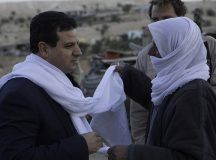In this impassioned opinion piece, Fathom editor Jack Omer-Jackaman protests the campaign to impeach MK Ayman Odeh, instigated by the Israeli right and thus far supported by much of the liberal centre. The case against Odeh is non-existent, Omer-Jackaman argues, and the process represents a political witch-hunt and the disenfranchisement of Odeh’s voters.
[* This article was first published on 9 July, several days prior to the failure of the vote to impeach Odeh in the Knesset. The author later added details in square parentheses to give added clarity following the vote.]
Casual Israel-watchers, understandably preoccupied by the ongoing horrors in Gaza and the fallout from the 12 Day War with Iran, may be forgiven for having missed the news that on 30 June the Knesset House Committee voted 14-2 in favour of the impeachment of MK Ayman Odeh. His fate will pass to the full Knesset on 14 July, where a vote of 90 will be enough for his ouster. The smart money is on the super-majority being achieved. [JOJ: In the event, the vote failed, the 73 votes in favour of impeachment not reaching the required 90. 15 votes were cast against the proposal. I am very pleased to have made an overly pessimistic prediction on the result, though 73 votes to 15 is not, I would argue, a result which ought to give those who share the concerns expressed in this article much comfort.]
The entire episode reeks of the traducing of a good and principled public servant and the deliberate and racist disenfranchisement of his constituents. It is but the latest conflagration in the coalition’s pyromaniacal crusade to burn Israel’s attenuated democracy to the ground.
A blatant witch-hunt
The ostensible architect of the campaign against the leader of the Arab Hadash-Ta’al faction was Likud MK Avichai Boaron. His justification? A January 2025 tweet from Odeh, following the then-latest agreement between Israel and Hamas, declaring that he was ‘happy for the release of the hostages and prisoners.’
At the time, Odeh’s words provoked a spate of horror and invective from that rather large portion of the Israeli political spectrum stretching from the far-right to the ‘liberal’ centre. How dare he equate the release of innocent hostages with that of terrorists; to which Odeh replied, not unreasonably, that the releases on the Palestinian side included not only proven and unrepentant killers but also a considerable number, including minors, held under administrative detention without trial. ‘Ayman Odeh proves once again that he is Hamas’s spokesman in the Knesset,’ said Yisrael Beiteinu chairman Avigdor Liberman, in slanderous defiance of all reason. ‘Free us from you and your ilk,’ demanded Religious Zionism MK Ohad Tal. MK Yaron Levi, of the centrist Yesh Atid, said, ‘This is what reality looks like through the eyes of a terrorist.’
Fast forward to last week’s ‘hearing’, chaired by coalition whip Ofir Katz. It found Likud MK Osher Shekalim telling the committee that if Odeh had his way ‘he would shoot each one of us in the head. In his subconscious, he wants to eliminate all of us here.’ Evidence for so serious a charge naturally cannot be found amongst the records of Odeh’s career, and outside of Soviet show trials people are not generally condemned for the imagined contents of their subconscious in any case. Sheakalim ought to seriously worry if this does become the norm: his conscious betrays his character damningly enough as it is. ‘In another country,’ he told Odeh and the fellow Arab MKs defending him, ‘they would put you in front of a firing squad.’
Chairman Katz, similarly, seemed envious of the brutality formerly available to the Assad regime, lamenting that if Odeh ‘had behaved like this in countries like Syria, they would have hanged him in the city square.’ Rather than impeachment, the right to bring a case ought to belong to Odeh – one of defamation and incitement to violence.
Ignoring the law
Nevertheless, impeachment it is. Following 2016’s Amendment 44 to Israel’s Basic Law: The Knesset, parliament may impeach a member guilty of ‘incitement to racism’ or ‘support for an armed struggle by an enemy state, or of a terrorist organization, against the State of Israel.’ I am no lawyer, but does one have to be to recognise as Orwellian distortion any attempt to make Odeh’s tweet fit the occasion?
It should surprise no-one that the committee ignored the experts whose testimony it either sought or was somehow unable to exclude. Expertise is all very ‘Deep State’. Knesset legal adviser Sagit Afik’s opinion certainly cut no dice. Impeachment, she advised, requires that ‘a clear case must exist in which there is a significant mass of clear, unequivocal and convincing evidence showing that support for armed struggle is a dominant feature within the framework of the candidate’s aspirations,’ and that ‘it is doubtful whether [Odeh’s] statement meets the test of support for an armed struggle by a terrorist organization. So too did Deputy Attorney General Avital Sompolinsky explain, rather less equivocally, that the tweet ‘does not meet the required threshold.’
Boaron made clear his contempt for all this legalese, saying in closing argument that the specifics were not important and that his crusade was against ‘Odeh as a person and everything he represents.’ So much for the process so far. It was precisely the inappropriateness of so self-interested a body as the Knesset being empowered to arbitrate, and the likelihood that only certain types of MKs would ever be so arraigned, which led many sensible observers, including now-President Herzog, to criticise the addition of Amendment 44 to the Basic Law.
Rank hypocrisy
There is absolutely nothing in Odeh’s lengthy career, including the tweet in question, to suggest he is dangerous or a threat to either Israel’s security or its democracy. The same cannot be said of many of his accusers. Recall the words of the Basic Law and ask if it was followers of Ayman Odeh who last week topped earlier murderous assaults on innocent West Bank Palestinians with an ‘an armed struggle’ against the Israeli state in the person of the IDF.
There is rank hypocrisy, too, in Odeh’s accusers invoking the sanctity of the hostages. It is he who has long championed a ceasefire and full hostage release, and many of them who have continually thwarted one. Dani Elgarat, attending the hearing, also pointed out to the committee that while they had been notable by their absence, Odeh had visited his family as they sat shiva after the death of his 68-year old brother Itzhik, murdered under Hamas torture in captivity.
While I personally accept the nuances of his tweet explanation, I don’t doubt that Odeh’s formulation offended many Jewish Israelis. However, if offence were a reasonable criterion for impeachment, and were the process not so nakedly disingenuous, then after the last two years the right-wing benches of the Knesset ought now to stand empty. Another of those sitting in committee judgement of Odeh was Moshe Saada of Likud – he who has said both ‘We need to annihilate the Gazans’ and ‘Yes, I’ll starve Gazans, yes, this is our obligation.’ I could go on with the words of genocidal incitement from elected officials over the last two years – repugnant to any decent observer – but I will keep the article at a digestible length. The sorry record is freely available.
So too are other instances of the hypocrisy by which impeachment for having given unpatriotic insult is selectively applied. It must certainly be Odeh, or another dangerous Arab MK, for example, who referred to the State of Israel as ‘an enemy state,’ ‘an abusive and evil regime,’ and ‘a Hebrew ghetto’; and its secular Jewish population as ‘a generation of people resembling human beasts who behave like two-legged animals.’ Except, of course, these were in fact the flattering assessments of United Torah Judaism MK Yisrael Eichler, a man who not only has not faced impeachment but is shortly set to take over the Housing Ministry. (This brief, incidentally, will afford him considerable influence over one of the sectors in which inequality between Arab and Jew in Israel is most pronounced; especially welcome news when another in his history of charming one-liners is that Reform Jews are ‘worse than the enemy,’ taken by most to mean a dog-whistle reference to Arabs.)
The real agenda
The reader takes my point: this sham procedure has nothing to do with indecent or dangerous language unbecoming a public official, and everything to do with the political defenestration of Ayman Odeh and the disenfranchisement of his Arab constituents.
Amongst honest observers, even those whose vision for the State of Israel does not accord with his own would be forced to acknowledge that Odeh is a sincere and peaceful public servant who has faithfully represented his constituency in a manner befitting a liberal democratic culture. That he is a vehement opponent of the occupation and a passionate advocate for Palestinian rights in the West Bank and Gaza as well as Israel does not lessen this status in the slightest; quite the contrary. This is not to lionise either Odeh or his party: their treatment of Volodymyr Zelensky, for example, was a total disgrace, betraying a classically infantile far-leftist interpretation of the Russian mutilation of Ukraine. (Though they are far from the only powerful Israelis who ought to reproach themselves their disrespect towards the Ukrainian President and his valiant nation.)
In the (bi)national context, however, Odeh is a parliamentarian of whom Israel ought to be proud, just as Haaretz is a newspaper of which it ought to be exceptionally proud. It is the type of newspaper on which a democracy relies, and is only ‘anti-Israel’ if the Israel one seeks is corrupt, chauvinist, and doomed forever to rule over another people, to the continued degradation and despair of the Palestinian nation and the eventual ruination of Israel itself.
The attempts of the right to destroy Odeh are of the same type as its attempts to destroy Haaretz. Already in November, the Netanyahu hate machine was trying to strangle the paper. The intimidation abounded again last week, most notably from the Mayor of Arad, Yair Maayan, whose response to Haaretz’s expose of the ongoing atrocities at aid distribution sites in Gaza was to announce its banning in the city.
This is the ‘democracy’ of the Israeli right and far-right, whereby one of the most precious concepts in human civilisation is revealed as nothing more than an international public relations punchline. Hate a parliamentarian? Kick him out. Loathe a newspaper? Try to shut it down.
The Kangaroo Committee has nothing on Odeh, for the simple reason that there is nothing to be had. It is a political hitjob in the garb of parliamentary procedure. Its aim is not merely personal (bad enough) but (worse) a concerted campaign to send a message to the 20 per cent of Israelis, part of whose identity is Palestinian, that they belong neither in the country nor in its democratic structure.
Like most anti-democratic moves, there is nothing complex or subtle going on here: polling consistently shows that disqualifying Arab candidates means, perfectly rationally, a decline in the Arab vote. This is a double win for the Israeli right: 1) politically, in that it promises a higher proportion of votes for them and a lower one for potential opposition blocs; 2) ideologically in that it furthers their exclusionary agenda. Committee Chair Katz, incidentally, has previous form for this kind of thing.
A further parenthetical underlining of the message was provided at Odeh’s hearing when MK Waleed Taha – of the Islamist Ra’am Party whose moderation was so embraced by the Israeli centre when it joined the unity government of Bennett-Lapid in 2021 – was ejected from proceedings for the sin of speaking in Arabic. (Recall the assurances that the subjugation of native language explicit in the 2018 Nation State Law were not racist at all.) In stark contrast, Baruch Marzel – the ultra-extremist acolyte of Meir Kahane barred from running for office by the Supreme Court – was a welcome and invited guest at the hearing.
Even before the campaign against him intensified, Odeh had announced that he would not seek re-election the next time Israelis go to the polls. (A horrible irony: if the Netanyahu government possessed a single ounce of civic responsibility, an election would have been called long ago; Odeh would have already retired, and they would be unable to pursue him as they now are.) Whether or not his remaining tenure is foreshortened by a successful impeachment, his leaving the field will be a blow to Israeli democracy. The wider impact of the impeachment is worse. Watching this degraded spectacle, how many aspirant Arab politicians will think twice before standing for office? Which discouragement, again, is clearly the point.
Whither the liberals?
Faced with such a scandal, one might reasonably have expected the representatives of Israel’s political centre – those purportedly standing foursquare against the coalition’s antidemocratic mania – to rise to the occasion and in defence of Odeh. Sadly, no. National Unity chief Gantz managed the kind of non-committal blandishment to which he too often resorts. [JOJ: Gantz’s party boycotted the vote.] Yesh Atid MK Simon Davidson and National Unity’s Pnina Tamano-Shata both voted in favour of impeachment (the only two dissenting votes were both from Arab MKs). Odeh ought to ‘decide whether he is a Gazan or an Israeli,’ said Tamano-Shata. Yesh Atid head Yair Lapid, the great hope of Israeli and diaspora soft liberals, declared ‘anyone who speaks like this should not be a member of Knesset.’
Lapid has also confirmed his intention to personally vote in favour of impeachment in the full vote, though the wider Yesh Atid Knesset faction will have a free vote – a relative Israeli rarity. [JOJ: In the event, while six Yesh Atid members voted in favour of impeachment, Lapid and the rest of the Knesset faction boycotted the vote.] The issue is dogging him somewhat. At a Yesh Atid event in Jerusalem this week, the first two questions from the floor concerned the impeachment. Lapid’s answer was that, having already announced he won’t seek re-election, and by refusing to apologise for his remarks, Odeh was cutting and running, grandstanding on the way out. He made clear, too, that it was less Odeh’s hostage-prisoner tweet that was moving him to vote for impeachment, and more Odeh’s remarks at a recent Haifa peace rally, to the effect that ‘Gaza will win’. Neither rationale offers Lapid the honourable escape he thinks they do.
Firstly, why shouldn’t Odeh grandstand if the stand is worth making, which it is in this case? Why should he apologise for reasons of political expediency when others with real reason to show remorse are not compelled to do so?
Secondly, a liberal democratic ethos as Lapid’s purports to be ought to recognise that his personal opinion of Odeh is irrelevant next to choosing to handmaiden the latest example of the coalition’s authoritarianism, to which in general terms he stands explicitly opposed.
Thirdly, the matter of Odeh’s ‘Gaza will win’ remarks. Again, he has explained these, perfectly satisfactorily – in fact laudably – in my view. ‘There is, and cannot be, victory over corpses of thousands of dead children, crushed families, starving civilians and total devastation,’ he clarified on X.
The right conducted this war out of blind vengeance, and was defeated. It’s a defeat for Netanyahu, Ben Gvir, and anyone who thought an entire people could be defeated through starvation, bombardment and siege… Because annihilation is not victory. Life is victory. Only those who see Gazans as “terrorists from birth,” like the government de facto does, can twist my words in this way. Yes, Gaza will win. Life will win.
You may disagree with this sentiment – though I don’t – but as with the prisoner-hostage tweet, approval is not the point. It is not a pro-Hamas sentiment and cannot reasonably be considered supporting the enemy in a time of war. I too hope that Gaza ‘wins’ in Odeh-ian terms.
Odeh’s sadness at his liberal Zionist abandonment was palpable, and it was hard to disagree with his resigned assertion that ‘some of them hate us more than they love democracy’. He might have added that some of them need to realise that effective opposition means more than the singular distinction of not being Bibi Netanyahu.
Further to the left, Yair Golan was better [JOJ: Golan’s Democrat faction voted against impeachment], as was the increasingly impressive Gilad Kariv. Odeh’s impeachment would be ‘another victory for the nationalist-extremist government over a secure and democratic Israel,’ said Golan. ‘This morning it’s Ayman. This afternoon it’s the public broadcasting corporation. Tomorrow it’s the attorney general. The day after tomorrow it’s you. Wake up.’
He’s right. Though it ought to be condemned first and foremost for its own sake, the hopefully renascent Zionist left would do well also to see the campaign against Odeh as a canary in the mine. Golan himself has already been subject to the most outrageous libels and calumnies for the sin of having objected to the criminal carnage in Gaza. (There is truly something sick at work when the mass death of children is fine but a man who protests the horror is a stain on the nation.) Is it ludicrous to think he might himself be victim of a future impeachment attempt, and his voters similarly disenfranchised? He has already been stripped of his reserve privileges, with Defence Minister Katz declaring that ‘there is no place for people like Golan in public life’.
If they come for Golan, would the massed ranks of the Kaplanists – those who fought the judicial coup so admirably but have largely been notable by their absence in defence of Odeh – then make their presence felt? (It’s not just the Zionist left who should rethink their position on Odeh for reasons of self-interest, if nothing else. Maariv’s cartoonist Uri Fink released a biting cartoon this week, in which Lapid and Gantz are shown following Odeh in walking a ship’s plank, forced at sword-point by Justice Minister Yariv Levin. ‘Sorry Ayman, but this time you really went over the top,’ they say, fingers wagging.)
Odeh’s valediction?
Amid his ordeal, Odeh spoke well. He spoke truthfully. And he spoke with dignity and with admirable defiance. ‘If I back down now,’ he thundered at the committee, ‘the fascist right will have succeeded in setting the boundaries of freedom of expression for Arab citizens, exactly as they want us: subjects, not part of a people, not part of a cause, without political or critical positions. That will not happen!’ He treated the occasion with the righteous contempt it deserved, his truest words spoken in direct accusation of his own accusers: ‘Those who never condemned, not even once, the killing of a single Palestinian child have no right to judge me… I am not the extremist here; you are the extremists.’
If these prove to be his valedictory remarks, then apt ones they will have been.




































